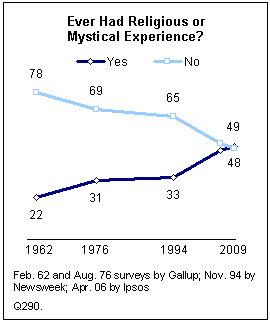Please Note: This is a discussion thread in the Mysticism DIR. Remember...this is not a debate thread.
How many mystics are there in the world? What's your best guess?
In most ways, not a very important question, but perhaps an interesting one.
......
I've been thinking about it on and off for a few days now. It seems to me that -- near as I can count/recall -- about 20% of the people I get to know well enough to talk about these things with turn out to be mystics. That is, they have had a mystical experience, which is what in my book makes them a mystic.
Of course, most of the people I meet are not people I end up talking about mysticism with. So, to be on the safe side, let's say that somewhere between 2% and 4% of humans have had a mystical experience.
Two to four percent is 1:50 to 1:25. This October, the UN estimates there are 7.7 billion people in the world. So, if al these assumptions hold true, then about 154 to 308 million people would be my guess of the number of mystics in the world.
......
The closest estimate I have seen to my estimate is Sam Harris' "off the cuff guess" (his words) of 100 million.
I have never heard of a rigorous study of the number or proportion of mystics in the world, although I have heard of related studies. For instance, a British study some years ago found about a third of Brits reported feeling overwhelming "awe" at some point in their lives, but overwhelming awe seems like it could include a number of experiences that were not actually mystical -- as I define the term.
________________
Just for fun...

